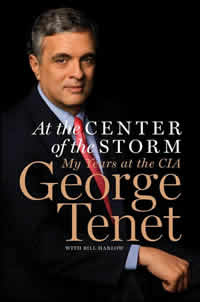Book Notes
 George Tenet, At the Center of the Storm; My Years at the CIA (New York: Harper Collins, 2007), 549pp.
George Tenet, At the Center of the Storm; My Years at the CIA (New York: Harper Collins, 2007), 549pp.
The sorts of controversies that have plagued George Tenet's effort to salvage his reputation begin on the very first page of his memoir. There he writes that on Wednesday, September 12, 2001, he entered the West Wing of the White House just as Richard Pearle was exiting. "As the door closed behind him, we made eye contact and nodded. I had just reached the door myself when Pearle turned to me and said, 'Iraq has to pay a price for what happened yesterday. They bear responsibility.' I was stunned but said nothing." The problem with this story is that Pearle says it never happened. He was in France at the time. Pearle also denies the substance of those remarks, even though he admits that he saw but did not speak with Tenet on September 19: "It never happened. I never said the things that he attributes to me."
When Tenet became director of the CIA in March 1997, he was the fifth director in seven years. Morale was horrible, technology was several generations old, human resources were meager, and funds were lacking. He inherited what one observer called a "burning platform." I don't doubt that Tenet strengthened the CIA during his seven years there (he resigned in July 2004). I also find many of his explanations of various failures convincing—the chaos, paranoia and intense fears following 9/11, human error (the American bombing of the Chinese Embassy in Belgrade), the ripple effects of the disputed 2000 election, the ambiguity and complexity of highly technical intelligence-gathering, personality clashes among exaggerated and self-important egos, party ideology, genuinely conflicting memories about what someone said or did, the competing agendas between policy makers in the White House and CIA analysts who are ostensibly neutral advice-givers, and an underrated and highly sophisticated enemy in Al-Qaida. Beyond these general explanations, Tenet repeatedly describes how hard-working, how honest, and how overworked he and his CIA colleagues were.
Fair enough. But why does Tenet remain utterly uncritical of Bush? Why did he not speak up when it could have counted and saved thousands of lives, billions of dollars, and the credibility of our country before the entire world? Why did he not resign, or refuse the Medal of Freedom? Some time ago Daniel Ellsberg wrote an op-ed in which he rehearsed how he leaked the Pentagon papers to expose the ugly truth about how five administrations had lied to the public about Vietnam, all the while believing that he would spend the rest of his life in prison. His only regret, he said, was that he did not do it earlier. He then wonders where the people are in the Bush administration who might have acted similarly.
George Packer, a staff writer for the New Yorker and author of the widely acclaimed book Assassin's Gate: America in Iraq, laments the lack of genuine accountability in Tenet's book. Rather, what we get is "an expected destination at the end of a well-trodden path that leads from disaster through obfuscation and defiance to a well-rewarded self-justification." No senior officials in the Bush administration or military have been held accountable for Iraq. Packer quotes a recent article in the Armed Forces Journal by the army lieutenant and Iraq veteran Paul Yingling, who reflects the "simmering rage" among active duty soldiers: "A private who loses a rifle suffers far greater consequences than a general who loses a war." For his many admitted failures, George Tenet collected a Medal of Freedom and $4 million for his book.


